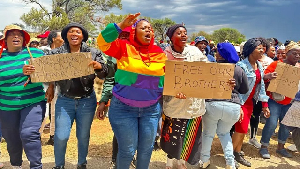An economist and a research lead at GCB Capital, Courage Boti, has projected that Ghana may witness a peak in inflation in March 2023.
According to him, the first two months of the year may be characterized by slower rates of inflation before it peaks in March.
“We should see much slower growth in inflation at least for January [2023] and February [2023] and we could be on course for a peak in March [2023]. But the situation is quite fluid,” he is quoted by myjoyonline.com.
He intimated that the depreciation of the cedi and Ghana’s inability to secure an IMF bailout may pose further challenges to the economy.
“We saw from March [2023], April [2023] last year, the rate of inflation was easing but then the depreciation [of the cedi] pressures set in. It appears if we could not achieve an IMF programme as soon as possible, the agitations could reemerge soon and that might mean more currency pressures,” he added.
The Ghana Statistical Service (GSS) announced that Ghana's consumer inflation for November this year has hit 54.1%%.
The 54.1% is an increase from the 50.3% recorded the previous month - November.
The consumer price index, according to Ghana Statistical Service measures changes in the price of a fixed basket of goods and services purchased by households.
It further said the assumption is that the basket is purchased each month, hence as the price changes each month, the total price of the basket will also change.
In a press release sighted by GhanaWeb, it said, "year-on-year inflation rate for December 2022 was 54.1%. This means that in the month of December 2022 the general price level was 54.1% higher than in December 2021. Month-on-month inflation between November and December 2022 was 3.8%."
Food inflation shot up from 55.3% to 59.7% whiles non-food inflation also rose to 49.9%.
Five divisions recorded inflation rates higher than the national average.
They were Housing, Water, Electricity, Gas, and Other Fuels (82.34%); Furnishings, Household Equipment (71.52%); Transport (71.42%); Personal Care, Social Protection, and Miscellaneous Goods and Services (60.94%) and Food and Non-Alcoholic Beverages (59.71%).
SSD/FNOQ
Business News of Thursday, 12 January 2023
Source: www.ghanaweb.com

















